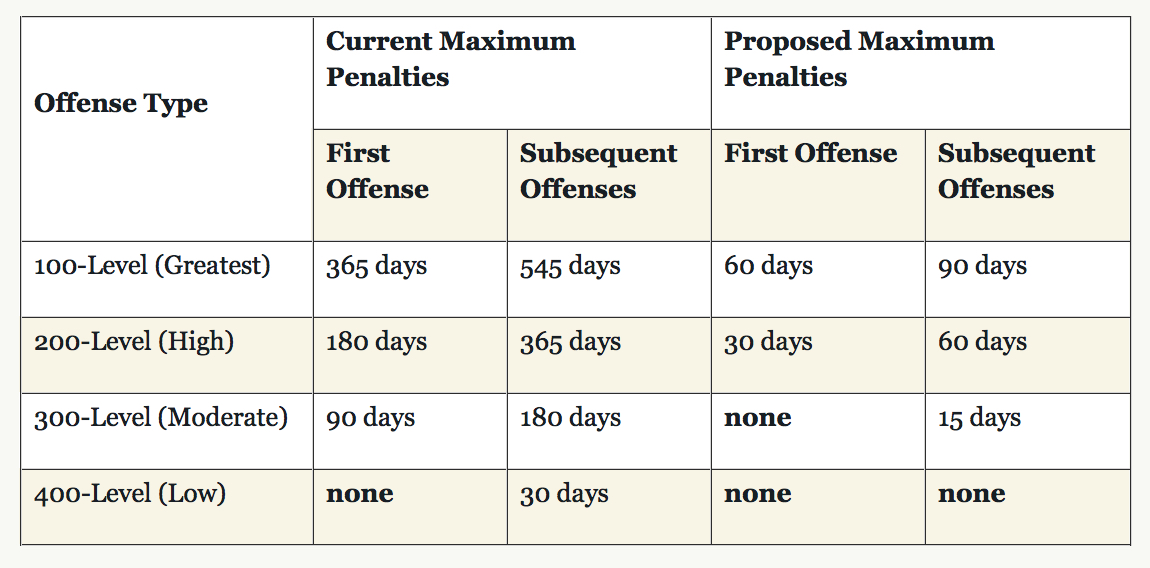This week:
Supreme Court Montgomery Decision Hints At Johnson Retroactivity
EDNY Court Sentences Child Pornography Downloader To 5 Days Of Jail
Obama Administration Pushes Changes In Use Of SHU
Gunning for the Guidelines: First Circuit Rules That Johnson Means Guidelines “Career Offender” Residual Clause Is Unconstitutional
Federal Corrections Task Force Issues Reform Recommendations
No Sriracha Action On Capitol Hill, But Plenty Of Drama
SUPREME COURT MONTGOMERY DECISION HINTS AT JOHNSON RETROACTIVITY
 The Supreme Court last week held in that its prior decision declaring automatic life sentences without parole for juveniles unconstitutional – Miller v. Florida – was retroactive to cases that were already final when it was decided.
The Supreme Court last week held in that its prior decision declaring automatic life sentences without parole for juveniles unconstitutional – Miller v. Florida – was retroactive to cases that were already final when it was decided.
Last week’s decision is good news for the pending Welch case, in which the Supreme Court must decide whether the 2015 Johnson v. United States (holding that the Armed Career Criminal Act’s residual clause is unconstitutional) should apply retroactively.
The Supreme Court used last week’s opinion to explain its approach to retroactivity. The Court said cases adopting a “substantive rule,” one that sets forth “categorical constitutional guarantees that place certain criminal laws and punishments altogether beyond the government’s power to impose,” would be retroactive. The Court said that when the government “enforces a proscription or penalty barred by the Constitution, the resulting conviction or sentence is, by definition, unlawful. Procedural rules, in contrast, are designed to enhance the accuracy of a conviction or sentence by regulating the manner of determining the defendant’s culpability. Those rules ‘merely raise the possibility that someone convicted with use of the invalidated procedure might have been acquitted otherwise’.”
Applying this rationale to the Supreme Court’s Johnson ruling suggests that it is likely that that decision – which adopted the substantive rule that a crime cresting a substantial risk of harm is not a violent crime – will be declared retroactive when the Supreme Court rules on Welch in the next five months.
Montgomery v. Louisiana, Case No. 14–280 (Jan. 25, 2016)
EDNY COURT SENTENCES CHILD PORNOGRAPHY DOWN-LOADER TO 5 DAYS OF JAIL
 Judge Jack B. Weinstein, one of a handful of Federal district judges known for thoughtful sentencing, has sentenced a child porn defendant to 5 days in jail, 7 years of supervised release and about $15,000 in fines and restitution.
Judge Jack B. Weinstein, one of a handful of Federal district judges known for thoughtful sentencing, has sentenced a child porn defendant to 5 days in jail, 7 years of supervised release and about $15,000 in fines and restitution.
In a 100-page Statement of Reasons issued last week, Judge Weinstein – who sits on the Eastern District of New York bench – said that the defendant, R.V., had pled guilty to a single count of possession of child pornography in violation of 18 U.S.C. Sec. 2252(a)(4)(B). R.V. had never had inappropriate sexual contact with any minor, and expert testimony showed he posed no danger to children. The judge said that in light of his children’s and spouse’s demonstrated need for his presence at home, R.V. should be sentenced to time-served of 5 days. R.V.’s guidelines imprisonment range was 78-97 months.
The judge argued that the “failure to distinguish among the multitude of vectors involved in a sentencing decision is particularly grave in the field of child pornography offenses. To be adjudicated guilty necessarily results in denomination as a sex offender; automatically provided is a lifetime of continuous punishment—being marked as a pariah with severe restrictions on residence, movements, activities and associations. Adding unnecessary, unduly long, periods of incarceration is inappropriate …”
United States v. R.V., Case No. 14-CR-0316 (E.D.N.Y., Jan. 22, 2016)
OBAMA ADMINISTRATION PUSHES CHANGES IN USE OF SHU
 In an op-ed column appearing in last Tuesday’s Washington Post, President Obama announced limits to the BOP’s use of segregated and disciplinary housing for investigations and as punishment.
In an op-ed column appearing in last Tuesday’s Washington Post, President Obama announced limits to the BOP’s use of segregated and disciplinary housing for investigations and as punishment.
The new policies also dictate that the longest a prisoner can be punished with solitary confinement for a first offense is cut to 60 days from 365 days. The president’s reforms apply to about 10,000 federal inmates serving time in solitary confinement.
A DOJ paper released the same day announced “guiding principles,” including
• limiting the use of the SHU as a form of punishment. Recommended changes include reductions of maximum penalties for disciplinary segregation, a ban on the use of the SHU for low-level offenses, and limitations on the use of “investigative” segregation, including a new requirement that routine investigations be completed within 7 days and all other investigations be completed within 30 days, absent compelling circumstances.
• setting policies to discourage placing inmates in the SHU during the final 180 days of their prison terms; and
• directing wardens to develop institution-specific plans for expanding out-of-cell time for SHU inmates, based on staffing and resource capacity.
How these principles will be implemented by the BOP is not yet clear. As of the end of last week, the BOP had not proposed any changes to its rules on use of the SHU for investigation or punishment.
Department of Justice, Report and Recommendations Concerning the Use of Restrictive Housing – Guiding Principles (January 25, 2016)
GUNNING FOR THE GUIDELINES: FIRST CIRCUIT RULES THAT JOHNSON MEANS GUIDELINES “CAREER OFFENDER” RESIDUAL CLAUSE IS UNCONSTITUTIONAL
 Anthony Soto-Rivera was a do-it-yourself tinkerer … or maybe just unlucky. Whatever the reason, he was caught carrying a Glock 23 handgun that fired full auto. That made the pistol a “machinegun” for purposes of 18 U.S.C. Sec. 922(o).
Anthony Soto-Rivera was a do-it-yourself tinkerer … or maybe just unlucky. Whatever the reason, he was caught carrying a Glock 23 handgun that fired full auto. That made the pistol a “machinegun” for purposes of 18 U.S.C. Sec. 922(o).
Anthony had prior convictions for drug trafficking and violence. Under Chapter 4B1.1 of the Guidelines, anyone with two prior drug or violent felonies who is convicted of a third such offense is sentenced as a “career offender,” with a much higher sentencing range. A “violent felony” for purposes of the “career offender” guidelines is the same as the definition in the Armed Career Criminal Act.
The district court held that Anthony’s possession of a machinegun was a violent crime under the residual clause. However, while his appeal was pending, the Supreme Court ruled in Johnson v. United States that the ACCA’s residual clause was unconstitutionally vague.
Anthony promptly asked the 1st Circuit to throw out his “career offender” sentence. The Government conceded that Johnson invalidated the “career offender” residual clause, but argued that other language in the Guideline made possession of a machinegun a violent crime.
Last week, the Court of Appeals sided with Anthony. It accepted the parties’ view that Johnson invalidated the “career offender” residual clause without specifically ruling on whether it did. The Court noted that the 11th Circuit has ruled that Johnson did not apply to the “career offender” residual clause, but said the 11th’s reasoning “appears well on its way to becoming a minority view.” The 6th, the 8th and the 10th Circuits have all held that the residual clause in the Guidelines is unconstitutional in light of Johnson. The 1st Circuit left little doubt that, if the Government had not conceded the point in this case, it would have ruled that way as well.
It is entirely possible that the application of Johnson to “career offender” cases will find its way to the Supreme Court. Such review will not happen before the one-year deadline to file for Sec. 2255 relief under Johnson, which falls on June 26, 2016.
United States v. Soto-Rivera, Case No. 14-1216 (1st Circuit, Jan. 22, 2016)
FEDERAL CORRECTIONS TASK FORCE ISSUES REFORM RECOMMENDATIONS
 Even as debate on sentencing reform raged last week, some bold recommendations issued from a congressionally mandated blue ribbon panel.
Even as debate on sentencing reform raged last week, some bold recommendations issued from a congressionally mandated blue ribbon panel.
The Charles Colson Task Force on Federal Correc-tions – established by Congress in 2014 due to concerns about the cost and scale of the BOP – issued its report, Transforming Prisons, Restoring Lives, last Tuesday. The report estimated that its recommendations would reduce the federal prison population by 60,000 over the coming years and save over $5 billion.
The recommendations include
• using mandatory minimums for only the most serious drug traffickers and felons, and giving judges more discretion to consider the specific circumstances of each defendant and case when imposing sentence;
• having the BOP “ensure that programming is allocated in accordance with individual risk and needs,” including programming tailored to individual inmate needs and encouraging more and better contact with family; and
• having the BOP give inmates good time for completing “risk-reducing” programs like addiction treatment, cognitive behavioral therapy, educational classes, faith-based programs and other self-betterment activities.
The recommendations are part of Congress’ effort to pass the Sentencing Reform and Corrections Act of 2015.
Charles Colson Task Force on Federal Corrections, Transforming Prisons, Restoring Lives (Jan. 26, 2016)
 NO SRIRACHA ACTION ON CAPITOL HILL, BUT PLENTY OF DRAMA
NO SRIRACHA ACTION ON CAPITOL HILL, BUT PLENTY OF DRAMA
 The Sentencing Reform and Corrections Act of 2015 (“Sriracha”) has yet to make it to the Congressional floor for a vote, and some critics are blaming conservatives for stalling efforts to get it there.
The Sentencing Reform and Corrections Act of 2015 (“Sriracha”) has yet to make it to the Congressional floor for a vote, and some critics are blaming conservatives for stalling efforts to get it there.
Freshman Republican Senator Tom Cotton (Arkansas), described by Politico as a “hawkish upstart,” pushed hard last week to kill Sriracha. Tensions over the bill, that effectively loosens some mandatory minimum sentences, spilled over during a party lunch last week, when Cotton lobbied his colleagues heavily against the legislation.
Cotton later told Politico “it would be very dangerous and unwise to proceed with the Senate Judiciary bill, which would lead to the release of thousands of violent felons. I think it’s no surprise that Republicans are divided on this question … [but] I don’t think any Republicans want legislation that is going to let out violent felons, which this bill would do.” His attempted rebellion against what has up to now been a bipartisan measure led Esquire magazine to run a story with the depressing title, Why Bipartisan Criminal Justice Reform Was Always a Pipe Dream.
 On the Presidential campaign trail, some observers are noting that Republican Sen. Ted Cruz (Texas), once a leading Republican advocate of sentencing reform, has repositioned himself as an opponent. Cruz is warning that letting federal prisoners out early will lead to an increase in crime. His reversal is especially startling, one commentator said last week, because the bill that Cruz opposes as dangerously soft on crime is less ambitious than the one he proudly cosponsored in spring 2014. In Reason Magazine online, Jacob Sullum wrote last Monday that “if Congress determines that certain sentences are unjust, it hardly seems fair that current prisoners should be forced to complete them. In any event, retroactivity did not seem to bother Cruz when it was included in the Smarter Sentencing Act, which like Grassley’s bill would allow currently imprisoned crack offenders to seek shorter terms under the rules enacted in 2010. According to Families Against Mandatory Minimums, that provision alone could affect up to 6,500 prisoners. Yet Cruz complains that ‘7,082 federal prisoners would be eligible for release’ under Grassley’s bill.”
On the Presidential campaign trail, some observers are noting that Republican Sen. Ted Cruz (Texas), once a leading Republican advocate of sentencing reform, has repositioned himself as an opponent. Cruz is warning that letting federal prisoners out early will lead to an increase in crime. His reversal is especially startling, one commentator said last week, because the bill that Cruz opposes as dangerously soft on crime is less ambitious than the one he proudly cosponsored in spring 2014. In Reason Magazine online, Jacob Sullum wrote last Monday that “if Congress determines that certain sentences are unjust, it hardly seems fair that current prisoners should be forced to complete them. In any event, retroactivity did not seem to bother Cruz when it was included in the Smarter Sentencing Act, which like Grassley’s bill would allow currently imprisoned crack offenders to seek shorter terms under the rules enacted in 2010. According to Families Against Mandatory Minimums, that provision alone could affect up to 6,500 prisoners. Yet Cruz complains that ‘7,082 federal prisoners would be eligible for release’ under Grassley’s bill.”
The news last week wasn’t all bad. During Thursday’s Republican presidential candidates’ debate – the one Donald Trump skipped – Sen. Rand Paul (Ky.) and Sen. Mark Rubio (Fla.) voiced their support for Sriracha. Paul said, “I think the war on drugs has disproportionately impacted our African-American community. What we need to do is make sure the war on drugs is equal protection under the law and that we don’t unfairly incarcerate another generation of African-American males.”
In Illinois, civil rights and faith leaders are pushing Republican Sen. Mark Kirk to support Sriracha. Kirk, who faces a tough reelection race this year in blue-leaning Illinois, has not yet backed the reform bill.
We’ll report every week on the status of legislation, whether it’s moving forward or just standing still.
Legal Information Services Associates provides research and drafting services to lawyers and inmates. With over 20 years experience in post-conviction motions and sentence modification strategy, we provide services on everything from direct appeals to habeas corpus to sentence reduction motions to halfway house and home confinement placement.
If you have a question, contact us using our handy contact page. We don’t charge for initial consultation.
Would you like a copy of this newsletter in PDF format? Click here.



